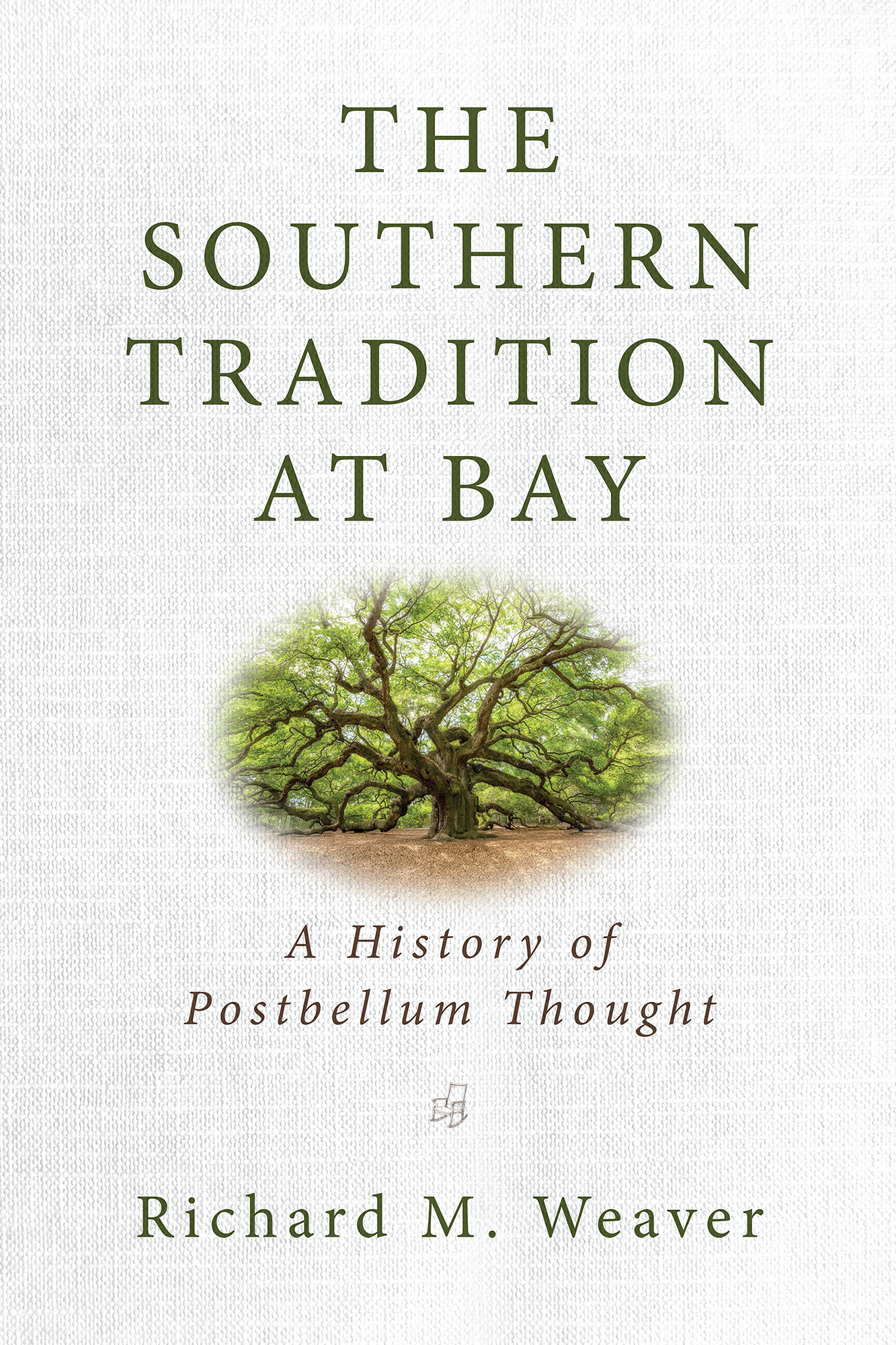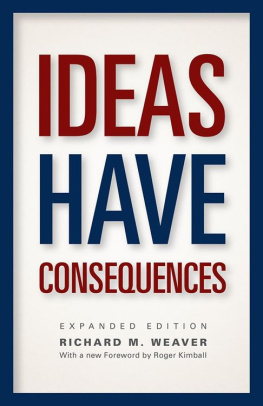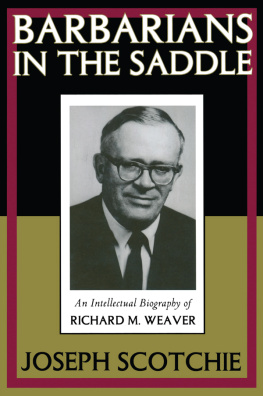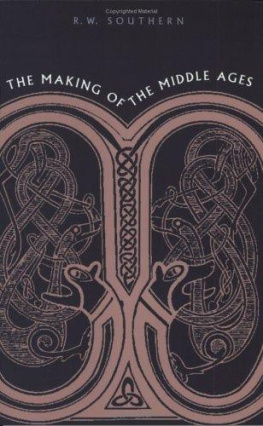Richard M. Weaver - The Southern tradition at bay: A History of Postbellum Thought
Here you can read online Richard M. Weaver - The Southern tradition at bay: A History of Postbellum Thought full text of the book (entire story) in english for free. Download pdf and epub, get meaning, cover and reviews about this ebook. year: 2021, publisher: Gateway Editions, genre: Science. Description of the work, (preface) as well as reviews are available. Best literature library LitArk.com created for fans of good reading and offers a wide selection of genres:
Romance novel
Science fiction
Adventure
Detective
Science
History
Home and family
Prose
Art
Politics
Computer
Non-fiction
Religion
Business
Children
Humor
Choose a favorite category and find really read worthwhile books. Enjoy immersion in the world of imagination, feel the emotions of the characters or learn something new for yourself, make an fascinating discovery.

- Book:The Southern tradition at bay: A History of Postbellum Thought
- Author:
- Publisher:Gateway Editions
- Genre:
- Year:2021
- Rating:3 / 5
- Favourites:Add to favourites
- Your mark:
- 60
- 1
- 2
- 3
- 4
- 5
The Southern tradition at bay: A History of Postbellum Thought: summary, description and annotation
We offer to read an annotation, description, summary or preface (depends on what the author of the book "The Southern tradition at bay: A History of Postbellum Thought" wrote himself). If you haven't found the necessary information about the book — write in the comments, we will try to find it.
The Southern tradition at bay: A History of Postbellum Thought — read online for free the complete book (whole text) full work
Below is the text of the book, divided by pages. System saving the place of the last page read, allows you to conveniently read the book "The Southern tradition at bay: A History of Postbellum Thought" online for free, without having to search again every time where you left off. Put a bookmark, and you can go to the page where you finished reading at any time.
Font size:
Interval:
Bookmark:

The Southern Tradition at Bay
A History of Postbellum Thought
Richard M. Weaver

To
John Crowe Ransom
Subtle Doctor

The South is the region that history has happened to.
Richard M. Weaver (1958)
R ichard Malcolm Weaver (19101963) was born in Asheville, North Carolina. A child of the piedmont Upcountry, he was the great-grandson of the Reverend Jacob Weaver (17861868), the patriarch of the Weaver connection whose descendants continue to gather each summer at Weaverville, the family seat in western North Carolina. Dick Weaver was educated in Asheville and Lexington, Kentucky. In Lexington he went on to study at the University of Kentucky, where he earned his A.B. in 1932.
He then moved to Nashville, Tennessee, to do graduate work at Vanderbilt University, from which he was granted his M.A. in 1934 after writing a thesis directed by John Crowe Ransom. Weaver left Vanderbilt without completing his Ph.D., but his thought had been profoundly changed by his stay there.
After three years of teaching at Texas A&M University, Weaver was strengthened in his determination to finish his professional education and to round out the sequence of studies undertaken at Vanderbilt. In the fall of 1940 he therefore entered the Ph.D. program at Louisiana State University, and by 1943 he had completed his dissertation, The Confederate South, 18651910: A Study in the Survival of a Mind and a Culture, which was directed by Cleanth Brooks. After a brief stint of teaching at North Carolina State University in Raleigh, Weaver was hired by the University of Chicago, where he taught for the rest of his life. Through his long years of teaching and writing in exile (as he would say of the Vanderbilt Agrarians who went north) and his steadily increasing influence as a national figure, Richard Weaver remained a self-conscious southerner, a man and scholar who remembered his origins and was certain of his identity even while his mind ranged far afield from Weaverville, North Carolina, and indeed from the South as a whole.
In his lifetime, Professor Weaver published Ideas Have Consequences (1948), a principled defense of one form of intellectual conservatism, and The Ethics of Rhetoric, a closely related group of essays on the dynamics of language. At his death he left in press a book on political philosophy, Visions of Order (1964); and he was revising the textbook that would become Rhetoric and Composition (1967). Upfront Liberalism, a representative selection of his most wide-ranging and characteristic essays, appeared in 1965 and was followed by a second book of his studies in rhetoric, Language Is Sermonic, in 1970. Last year a collection of Weavers southern essays was published by Liberty Press, what should be his last book.
All of this work has markedly influenced the revival of philosophical conservatism in the American academy as well as deepening and enriching southern studies and the discipline of rhetoric. During the last decade of his short life Weavers visibility in and out of the academy increased as some of his best essays and reviews appeared in Modern Age and the National Review. Today much of his work is in print, and his reputation remains high.
The foundation for these essays and books was laid in The Southern Tradition at Bay: A History of Postbellum Thought, the revision of his dissertation, The Confederate South. Donald Davidson (who had taught Weaver at Vanderbilt) pointed this out in the foreword that he wrote to accompany The Southern Tradition at Bay when it was first published in 1968. This study had by then endured a long, precarious existence in manuscript. The dissertation from which it was drawn had long been known by influential scholars and recognized as seminal. Weaver himself had modestly, even diffidently, set the manuscript aside after it was rejected by the University of North Carolina Press in the mid-1940s; but he obviously continued to believe in its originality and rightness, for he did not destroy the manuscript and kept it near at hand. Now, some forty-six years after it was first written, twenty-six years after its makers death, and twenty-one years after its long-delayed publication, The Southern Tradition at Bay more than justifies Weavers faith in it. Today this study enjoys the status of a familiar and often remarked component of the regions intellectual history, a history whose earlier stages constitute its subject. Despite its deservedly high reputation, The Southern Tradition at Bay will have been out-of-print for more than a decade when this republication occurs.
With this reissue of the study, no defense of the value and importance of Richard M. Weavers work need be advanced. Neither does it seem appropriate for the editors to demonstrate in detail the extent to which Weavers intellectual development derives from what he learned in investigating this segment of the Souths cultural history. Therefore we have dropped the original preface, Professor Davidsons foreword, and Paul M. Varnells bibliography of Weavers publications. Aside from having a few typographical errors corrected, we have made no changes in Weavers text. As was said in the original preface, we have followed the scriptural injunction in editing this work: nothing has been added or taken away.
George Core and M. E. Bradford
A ll studies of American civilization must recognize the strong polarity existing since early times between North and South. The government of the United States was founded on abstract propositions: the facts of varying topography, climate, and race made regional development inevitable; the regions arriving at their own interpretations of the propositions produced, on the political level, sectionalism. These circumstances have posed a problem for writers who sought to characterize the United States, and the problem has been solved in the only way possible: that is, by taking the mentality and the institutions of the majority section as best entitled to the name American. I expect to speak of the South therefore as a minority within the nation, whose claim to attention lies not in its success in impressing its ideals upon the nation or the world, but in something I shall insist is higheran ethical claim which can be described only in terms of the mandate of civilization. In its battle for survival the South has lost ground, but it has kept from extinction some things whose value is emphasized by the disintegration of the modern world.
This work concerns itself with a tradition, which means a recognizable pattern of belief and behavior transmitted from one generation to the next. Traditions must have, of course, a sufficient coherence to be distinguishable as integers; yet in characterizing a tradition as Southern one encounters the same difficulties as in characterizing another American. Within each there will be dissidence and minority reports. It is plain that there were things done in the South which were not Southern, and things done in the North that were not Northern, as we are compelled to understand these terms. Really we are faced with a problem in logic; and it is enough, I think, to be aware of the fallacies of composition and division. The first is an assumption that what is true of a part, or even of a number of partsthe proportion being incapable of determinationis necessarily true of the whole. The second is an assumption that what is true of the whole is also true of every single part. To say that Southerners have differed in point of view from Yankees does not speak for every single Southerner, but it does express a substantial truth.
Font size:
Interval:
Bookmark:
Similar books «The Southern tradition at bay: A History of Postbellum Thought»
Look at similar books to The Southern tradition at bay: A History of Postbellum Thought. We have selected literature similar in name and meaning in the hope of providing readers with more options to find new, interesting, not yet read works.
Discussion, reviews of the book The Southern tradition at bay: A History of Postbellum Thought and just readers' own opinions. Leave your comments, write what you think about the work, its meaning or the main characters. Specify what exactly you liked and what you didn't like, and why you think so.











